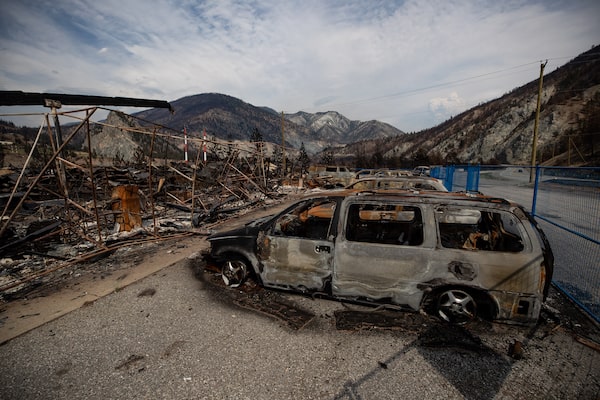
The remains of a large structure and vehicles destroyed by the Lytton Creek wildfire on the side of the Trans-Canada Highway near Lytton, B.C., on Aug. 15, 2021.DARRYL DYCK/The Canadian Press
Ottawa has confirmed that British Columbia is eligible for its request of $416-million in federal relief for last year’s wildfires, as record payouts for increasingly likely natural disasters push the federal government to reform its assistance program and invest in preparation.
The wildfire payment, announced Friday, combines with Ottawa’s $5-billion commitment to B.C. for floods last year to eclipse any previous payouts from the Disaster Financial Assistance Arrangement program.
“Last year was overwhelmingly the highest amount that will be extended from that fund,” said Bill Blair, Federal Minister of Emergency Preparedness, in an interview on Friday.
B.C. adopts emergency alert system for disasters, but not extreme heat
In wildfire country, towns build permanent evacuation centres
In the five years prior to 2021, the DFAA program paid out a total of $580-million to provinces and territories. Mr. Blair has now launched a review to put the DFAA program on a sustainable path, as climate change fuels more frequent and costly catastrophes. He said the unprecedented amount of money Ottawa is paying out for disasters needs to be spent in a way that helps reduce risk in the future.
“The work that we’re doing in recovering from the floods and the fires, not just the British Columbia, but across the country, has to be informed by a better approach, one more focused on preparation and prevention.”
The $5.4-billion payout to B.C. could yet increase, as the province works through the costs of rebuilding. Ottawa’s share of disaster funding is only a portion of the costs: An analysis by The Globe and Mail suggests the cost of rebuilding from the B.C. floods alone could reach $9-billion.
This year is already testing disaster response in Canada. Severe flooding has displaced thousands of people in southern Manitoba and northern Alberta. Some B.C. communities are already seeing high streamflow advisories as they prepare for the spring freshet.
Now, forecasters are warning that Western Canada faces a higher-than-normal risk for wildfires this year.
Fire research analyst Richard Carr from Natural Resources Canada said Friday the consensus of climate models point to warmer and drier weather across the southern half of the country, which could increase fire activity by mid-July. In the West, that will be exacerbated by existing drought conditions.
To combat wildfires, the federal government has promised $516-million to train 1,000 additional firefighters across the country and to increase funding for equipment. In addition, Mr. Blair said Canada will launch a satellite monitoring system to help detect wildfires faster, although that system will not be in place to help this year.
“That’s a very significant investment and it’s going to take a considerable period of time,” Mr. Blair said.
British Columbia has had its three worst wildfire seasons on record in the past five years, including last year when the town of Lytton was consumed by fire during a heat wave that killed more than 500 people across the province.
Five months after the heat wave, extreme rainfall across southern B.C. led to flooding and debris slides that damaged railways, hydro lines, pipelines, dikes, bridges and key highways; displaced thousands of residents; and put 1,100 farms underwater.
Mr. Blair has been touring communities that are recovering from flood and fire, and acknowledged that there is frustration with the pace of reconstruction. He visited Lytton on Thursday to speak with residents who, more than 10 months after losing their homes and businesses, are still waiting for rebuilding to begin. He said he is working to get an advance of the $416-million in federal assistance paid out by early summer, rather than wait for all the receipts.
Lytton resident Denise O’Connor met with Mr. Blair when he toured the community.
“I was impressed that he came. We haven’t seen a lot of people come here to see what we are dealing with,” Ms. O’Connor said.
Reconstruction efforts have been delayed by complex archeological studies and testing for toxins in the soil, and most people are living in temporary accommodation in other communities. Ms. O’Connor is waiting to find out if she can rebuild her own home.
“I don’t know what the future is going to going to bring. Right now I am living day-to-day,” she said. Ms. O’Connor has just been elected president of the local Chamber of Commerce, and Mr. Blair asked her how many shops were lost in the fire.
“It was every business in the town,” she explained.
We have a weekly Western Canada newsletter written by our B.C. and Alberta bureau chiefs, providing a comprehensive package of the news you need to know about the region and its place in the issues facing Canada. Sign up today.